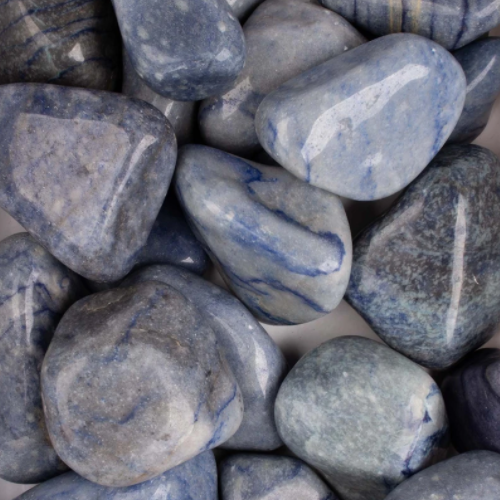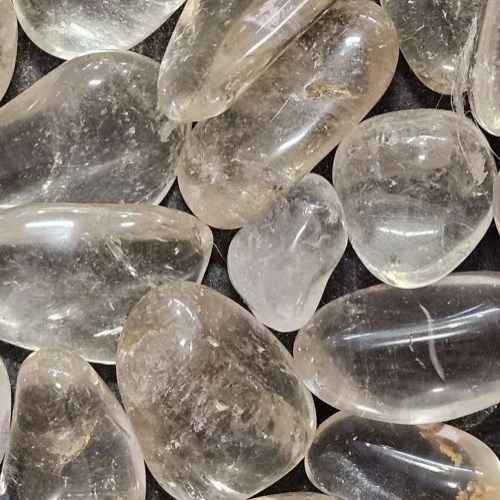Product Description
Quartz Lemon Tumbled Stone
Mineral Information:
Lemon Quartz, also known as Lemon Citrine or Yellow Quartz, is a variety of quartz that exhibits a vibrant yellow color. It is a transparent or translucent stone that derives its color from trace amounts of iron within the quartz crystal lattice. Here are some key characteristics and properties of Lemon Quartz:
Color: Lemon Quartz is characterized by its bright and sunny yellow color. The shade of yellow can range from pale or pastel yellow to a deeper, golden hue. The color is typically consistent throughout the crystal.
Transparency: Lemon Quartz can exhibit varying levels of transparency, from transparent to translucent. The clarity of the stone allows light to pass through, creating a vibrant and luminous appearance.
Crystal Form: Lemon Quartz shares the same hexagonal crystal structure as other quartz varieties. It occurs as individual crystals or as clusters, displaying a prismatic shape with pointed terminations.
Lemon Quartz is highly valued for its vibrant color and metaphysical properties. It is commonly used in jewelry, such as pendants, earrings, and rings, as well as in ornamental and decorative pieces. Lemon Quartz is also used in crystal healing and is thought to support emotional well-being, energy cleansing, and manifestation practices.
It's important to note that Lemon Quartz can be found naturally or created through a heat-treated process. Heat treatment is commonly used to enhance the color of quartz, including Lemon Quartz. When acquiring Lemon Quartz, it is advisable to verify its origin and treatment status to ensure transparency and authenticity.
Metaphysical Meaning:
Lemon Quartz is associated with energizing and uplifting properties. It is believed to promote positivity, clarity, and personal power. Lemon Quartz is said to enhance focus, concentration, and confidence while providing a boost of creativity and optimism.
Mineral Care:
Lemon Quartz, like other varieties of quartz, is generally considered to be a durable and hard mineral. However, it is still important to handle Lemon Quartz with care due to its crystal structure and potential factors that can affect its fragility:
-
Crystal Structure: Lemon Quartz has a hexagonal crystal structure, which contributes to its overall durability. Quartz crystals, including Lemon Quartz, are relatively hard with a Mohs hardness of 7, making them resistant to scratching and everyday wear.
-
Internal Inclusions: While Lemon Quartz is valued for its vibrant yellow color, it can sometimes have internal inclusions or fractures that may affect its overall structural integrity. These inclusions or fractures can create weak areas within the crystal, which could make it more susceptible to breakage if exposed to stress or pressure.
-
Sharp Edges: Like other quartz crystals, Lemon Quartz may have sharp points or delicate edges. These areas are more vulnerable to chipping or breakage if they come into contact with hard surfaces or experience accidental impacts.
To minimize the risk of damage to Lemon Quartz, it is recommended to follow these guidelines:
-
Handling: When handling Lemon Quartz, hold it securely but avoid applying excessive pressure or gripping it too tightly. Support the crystal from the sides or base, especially if it has sharp points or delicate edges.
-
Storage: Store Lemon Quartz crystals in a safe and secure location, preferably individually or separated from other harder minerals or objects that could potentially cause damage through contact or impact.
-
Cleaning: Use gentle cleaning methods for Lemon Quartz, such as rinsing it with lukewarm water or using a soft cloth. Avoid harsh chemicals or abrasive cleaners that could damage the crystal's surface or its overall appearance.
-
Protection: If you transport or display Lemon Quartz, consider using protective padding or containers to prevent accidental impacts or collisions.
By handling Lemon Quartz with care and being mindful of its potentially delicate edges or internal inclusions, you can help preserve its beauty and integrity over time. While quartz is generally considered durable, it is still possible for it to chip or break if subjected to significant force or pressure.
Disclaimer:
No information here is intended to diagnose, treat or cure ailments or afflictions of any kind. One should always consult a medical professional if a serious issue presents itself.












